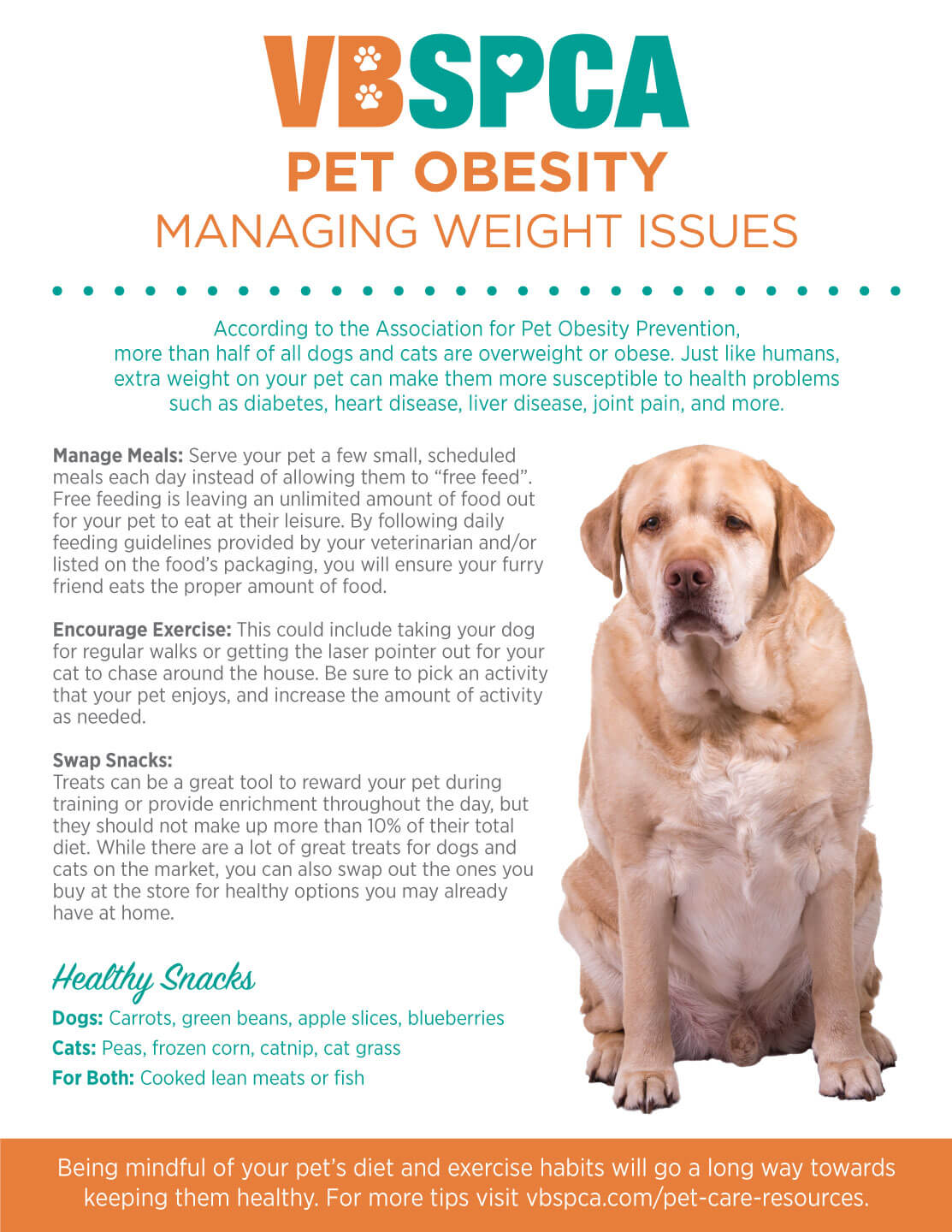We’ve all been there: our pets do something cute or start to beg, and we head for the pantry to get them a treat. While it’s fine to give our furry friends a snack here or there, it is extremely important to keep them at a healthy weight with the help of exercise and a proper diet.
According to the Association for Pet Obesity Prevention, more than half of all dogs and cats are overweight or obese. Just like humans, extra weight on your pet can make them more susceptible to health problems such as diabetes, heart disease, liver disease, joint pain, and more.
Is My Pet Overweight?
Your pet will be weighed during his annual veterinary exam, but you also need to keep an eye on your pet throughout the year and note any changes. You should be able to easily feel your dog or cat’s backbone and ribs without pressing down. Additionally, you should be able to look down at your pet and see a noticeable waist between the rib cage and the hips.
There are a few things that can contribute to weight problems in pets. Illness, overfeeding, and lack of exercise can all lead to weight problems. If your pet is overweight, it is best to talk with your veterinarian to try to get to the root of the weight gain and decide on a game plan to help your furry friend drop those extra pounds.
Keeping Weight in Check
Even if your pet is not overweight, there are things you can do to help them maintain a healthy weight.
- Manage Meals
Serve your pet a few small, scheduled meals each day instead of allowing them to “free feed”. Free feeding is leaving an unlimited amount of food out for your pet to eat at their leisure. This practice does not allow you to know exactly how much food your dog or cat is eating throughout the day. By following daily feeding guidelines provided by your veterinarian and/or listed on the food’s packaging, you will ensure your furry friend eats the proper amount of food.
- Encourage Exercise
Motivate your pet to move! This could include taking your dog for regular walks or getting the laser pointer out for your cat to chase around the house. Be sure to pick an activity that your pet enjoys, and increase the amount of activity as needed.
- Swap Snacks
Treats can be a great tool to reward your pet during training or provide enrichment throughout the day, but they should not make up more than 10% of their total diet. While there are a lot of great treats for dogs and cats on the market, you can also swap out the ones you buy at the store for healthy options you may already have at home.
For Dogs: Carrots, green beans, apples (remove core and seeds), blueberries
For Cats: Peas, frozen corn, catnip, cat grass
For Both: Proteins, such as cooked lean meats or fish
You can also set aside some dry food from one of your pet’s meals for the day and give the kibble out as treats or hide it in a puzzle toy.
Being mindful of your pet’s diet and exercise habits will go a long way towards keeping them healthy. And one last tip: consider removing your dog or cat from the room during human meal times so that no one is tempted to hand out table scraps!





Posted: October 12, 2021 by vbspcaadmin
Pet Obesity | Managing Weight Issues
We’ve all been there: our pets do something cute or start to beg, and we head for the pantry to get them a treat. While it’s fine to give our furry friends a snack here or there, it is extremely important to keep them at a healthy weight with the help of exercise and a proper diet.
According to the Association for Pet Obesity Prevention, more than half of all dogs and cats are overweight or obese. Just like humans, extra weight on your pet can make them more susceptible to health problems such as diabetes, heart disease, liver disease, joint pain, and more.
Is My Pet Overweight?
Your pet will be weighed during his annual veterinary exam, but you also need to keep an eye on your pet throughout the year and note any changes. You should be able to easily feel your dog or cat’s backbone and ribs without pressing down. Additionally, you should be able to look down at your pet and see a noticeable waist between the rib cage and the hips.
There are a few things that can contribute to weight problems in pets. Illness, overfeeding, and lack of exercise can all lead to weight problems. If your pet is overweight, it is best to talk with your veterinarian to try to get to the root of the weight gain and decide on a game plan to help your furry friend drop those extra pounds.
Keeping Weight in Check
Even if your pet is not overweight, there are things you can do to help them maintain a healthy weight.
Serve your pet a few small, scheduled meals each day instead of allowing them to “free feed”. Free feeding is leaving an unlimited amount of food out for your pet to eat at their leisure. This practice does not allow you to know exactly how much food your dog or cat is eating throughout the day. By following daily feeding guidelines provided by your veterinarian and/or listed on the food’s packaging, you will ensure your furry friend eats the proper amount of food.
Motivate your pet to move! This could include taking your dog for regular walks or getting the laser pointer out for your cat to chase around the house. Be sure to pick an activity that your pet enjoys, and increase the amount of activity as needed.
Treats can be a great tool to reward your pet during training or provide enrichment throughout the day, but they should not make up more than 10% of their total diet. While there are a lot of great treats for dogs and cats on the market, you can also swap out the ones you buy at the store for healthy options you may already have at home.
For Dogs: Carrots, green beans, apples (remove core and seeds), blueberries
For Cats: Peas, frozen corn, catnip, cat grass
For Both: Proteins, such as cooked lean meats or fish
You can also set aside some dry food from one of your pet’s meals for the day and give the kibble out as treats or hide it in a puzzle toy.
Being mindful of your pet’s diet and exercise habits will go a long way towards keeping them healthy. And one last tip: consider removing your dog or cat from the room during human meal times so that no one is tempted to hand out table scraps!

Category: VBSPCA News
Search
Ways to Give
Annual Sponsors
To view our Donor Privacy Policy, click here.